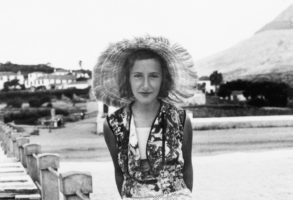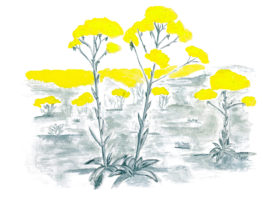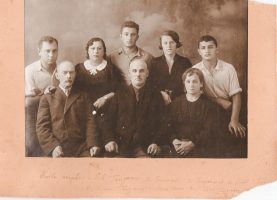Support Hidden Compass
We stand for journalism, science, history, and hope. Make a contribution to Hidden Compass and stand with us.
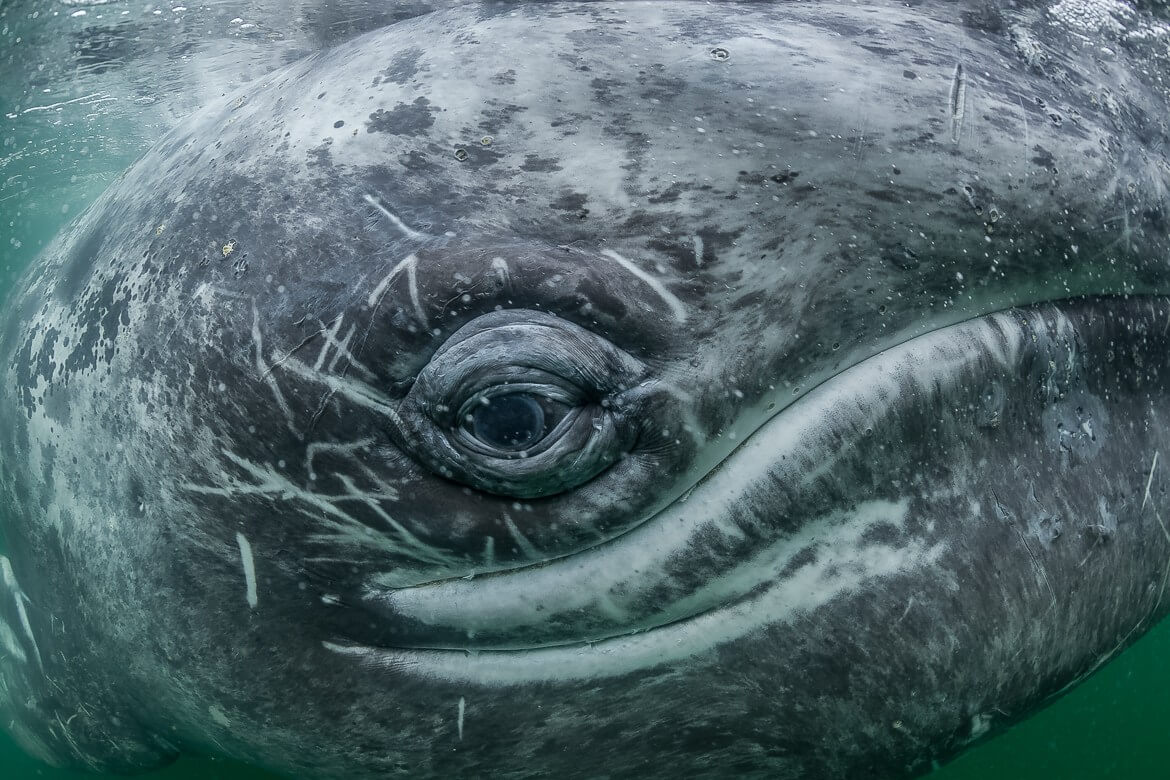
The eye of a gray whale swimming in San Ignacio Lagoon. PHOTO: THOMAS P. PESCHAK/GETTY IMAGES.
In the sun-toasted desert of Southern Baja, Mexico, there is a remote lagoon where colossal, primeval creatures and mankind interact — a place of magic, where dreams are fulfilled and fantasies come true. It is called San Ignacio.
When I need solace and introspection, I find it here, where the vast horizon is ringed with purple mountains and rolling sand dunes, and where coyotes sing me to sleep with towering arias to the moon. It is a land as vast and open as to reduce the mightiest ego to a grain of sand; part of the Vizcaino Biosphere, where a quarter of the Baja peninsula and all of its creatures are under federal protection. For 20 seasons, I have worked here as both guide and naturalist.
Our acceptance of each other as equals is immediate and lasting. I have been eye to eye with them; seen their intelligence, and felt that I might know their thoughts.
The lagoon is a rare domain where wild animals, in their natural habitat, routinely seek human contact. It is a place of sanctuary where they are not hunted. These creatures, which approach half a ton at birth and can reach 40 tons at adulthood, return annually in a migration that covers almost 14,000 miles, because they know they are safe here. It is, in fact, a giant nursery where young calves are taught the fine art of being a whale.
Born with little instinct, they are as helpless as human infants and learn everything from swimming to eating, by mimicking their mother. From the time she pushes her baby to the surface to draw its first breath, mom has six to eight weeks to get her prodigy in shape to swim 7,000 miles through orcas and sharks to Alaska’s northern waters, where the two of them will feed for the summer. If the mother dies, the baby will soon follow, as gray whales are not known to adopt orphans.
Mother whales approach our boats with their calves to show off their handiwork — a behavior not seen on the open ocean. They hold them on their backs or swim upside down with baby on their stomach or pectoral fin. I believe coming to our boats is a reward granted by mother when the baby has had a good day of conditioning. That sort of makes us their bath tub toys as they sometimes push us around, all the while being gentle as kittens.
Our acceptance of each other as equals is immediate and lasting. I have been eye to eye with them; seen their intelligence, and felt that I might know their thoughts. I have had them press against my outstretched hands holding steady while giving them a proper scratch. I have had them stay with me for hours, one studying the other, all the while feeling safe in each-others’ presence. They are benign giants who desire our companionship, and I have come to know individuals who return here year after year, easily identifiable by color patterns, scarring, and birthmarks. The fishermen who drive our boats have named many of them. But, the ocean is a harsh mistress and there is a natural and unexplainable death rate among these creatures that is a heartbreaking fact of nature.
This story is about one of those deaths, and how it revived a life.
~~
Much of my free time in San Ignacio is spent in a kayak, gliding silently through miles of shallow channels lined with mangroves. Countless sea birds fill the shore like a sports stadium and have no fear at my approach, while rainbow-colored fish huddle beneath my hull. Red and orange crabs scurry along the bottom, running from my shadow. Osprey soar high overhead before diving like kamikazes, unerringly taking surface fish. Pelicans make suicidal head-first dives, only to have lurking Heermann’s gulls fly straight into their extended pouches and steal part of their haul. The seagulls have learned to drop clams on the rocks to break them open. To all of them, I am simply an errant floating log, a silent observer of the grand ballet of nature that performs each day on this epic stage. It is a land rich with life, but tempered by the equality of death, and it is on such a morning that I spot her body.
We call them floaters, those that die during their grand swim from the frigid northern waters of the Bering and Chuksi Seas north of Alaska. I approach this whale to look for an obvious cause of death. She is a mature female, perhaps 30 feet long; her side stove in, most likely from a massive wave cutter that is so common on the prow of today’s cargo ships. As she rolls back and forth on the tide, voracious gulls have already begun to strip her carcass. By tomorrow the crabs will find her, and in three days, all that remains will be a skeleton. When it comes to death, nature is an efficient mistress.
I know this whale by a large white saddle patch on her right flank. I have seen her before, two seasons ago. As I circle her I am stunned at what I find: Her calf is huddled close, nudging her, trying to awaken her. This mother had no calf when I last encountered her. Grays bear their young every other year after a 13-month gestation, and I figure this calf to be no more than a couple months old. Without its mother, the end will come soon.
I slowly back off, feeling myself an intruder, knowing I can do nothing to help her, but as I turn to paddle away, the young whale breaks from its mother, and swims to me. She turns parallel, spooning my boat, hugging me as only a creature with no arms can. With her mother gone, she desperately claims me as a surrogate. She presses against my boat and I run my hand along her rubbery skin. This is a phenomenon called transference that is new to me.
I am now this whale’s universe.
~~
She logs there in the water, her eye imploring mine, begging for something I cannot give. Over the years, I have been present at countless deaths upon the water, but none has affected me like this. I stroke the young whale’s head; run my hand along the line of her mouth, as tears return me to the day my own mother died.
I could not cry for her then. Mine was a grief of denial. I buried my feelings along with her ashes, and whenever the memory tries to come back to me, I turn it away.
But now, as I look into this young whale’s eye, the past is returning against my will. Once again, I see my mother on white hospital sheets, waiting for the end, her smile telling me she loves me and that it is all right, but her eyes plead with me not to let her go. After so many years, that same sense of helplessness blindsides me, and I scream like a demon — as the wind carries my lament away, unheard, over the waves.
I want to fight the universe; I want to yell at God. I know what this whale feels, but now is not my time. It is hers, and now she is my charge. I know what I must do.
I slip out of my boat, inflate my vest so I don’t have to swim, and hang there in the water stroking the grieving whale. She does not fight or move, but allows me to hold her as I cry for both of our losses, hers recent, and mine from so long ago. I am a poor substitute for her mother, but experience has taught me the importance of touch to these creatures. It is all I can offer.
I am unaware of time. Eventually, I slide back into my boat and head for open water, knowing the newborn will follow. If she returns to the sea, death will claim her quickly, and that is preferable to the slow torture of starvation. I paddle hard into the face of the incoming waves and see the little whale trying to keep pace while being overwhelmed by the surf that is reclaiming her.
Bracing against the waves, I pray not to see her again. I yell for God to take her, and then she is gone.
~~
If it is a dream, I embrace it completely.
I am a man who is slow to tears, but this young whale triggers something deep. I want to believe she was sent by my mother to reconnect with me, though I know that is a wishful fantasy. But in this place of magic, a wish can sometimes seem real.
A soft breeze caresses me and I feel her presence, loving and warm. If it is a dream, I embrace it completely.
Alone in the kayak, bobbing like a seabird; all those years of love and kindness come back to me. On the vast canvas of the sky, I can see my mother’s face from my childhood, a face that has turned opaque in my mind after so many vacant years. I call her name and suddenly she is young and beautiful once more: her brown hair as it was when I was a child; her lipstick adding just a dash of color. Her scent envelopes me as she takes me in her arms with that cheerful laugh I have missed so much. I remember reaching for her dangly earrings, and in these fleeting moments, I too am young again, happy as memories return to me, and I feel a peace I have not known since she died. For these precious moments, we float on the water together; the only two people on earth.
I lock her inside my heart, never to fade again, and choose to believe the little whale carried her message to me. I make a wide turn and paddle for camp as the wind dries my tears.
Nature is cruel, but also tender. On this day she took one mother away, but gave another one back.
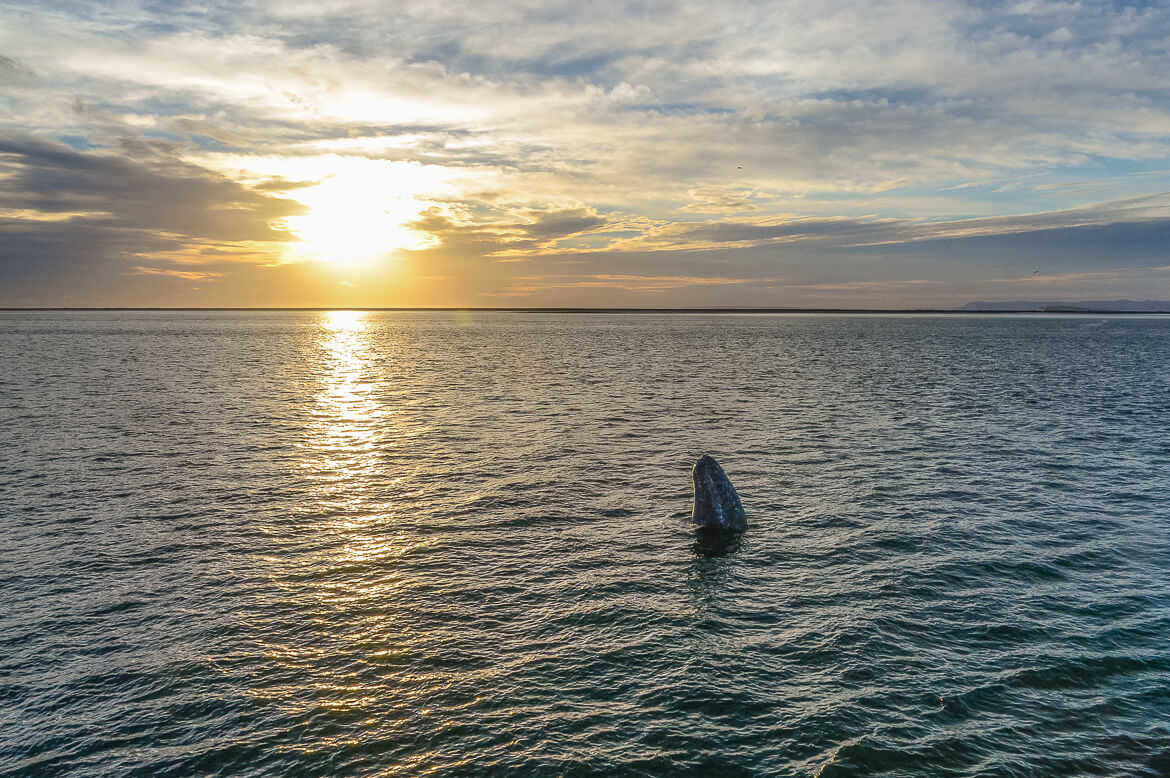
A gray whale spy-hopping at sunset in the waters of San Ignacio. PHOTO: TIM MELLING.
James Michael Dorsey
James Michael Dorsey is an award-winning author, and explorer, who has spent decades documenting vanishing cultures in Africa and Asia.
Never miss a story
Subscribe for new issue alerts.
By submitting this form, you consent to receive updates from Hidden Compass regarding new issues and other ongoing promotions such as workshop opportunities. Please refer to our Privacy Policy for more information.

